23 Best Bedtime Habits for Sleeping like a Baby…zzz
Are you tossing and turning every night? Not able to get a good night’s rest from whether it be insomnia, back pain, or more? Want to know the best bedtime habits for an easier sleep? Here are some great habits to follow every night below!
12 Best bedtime habits from restonic:
1. Keep electronics out of your bedroom for better sleep quality. This is at the top of the list for good reason – it was a universal rule among our experts. They all agreed that the blue light from tablets, laptops, and smartphones interferes with falling asleep because it suppresses melatonin, an essential hormone for sleep.
“On a less scientific note, keeping smartphones and tablets out of your bedroom helps you to fall asleep earlier,” says Leslie Fischer, the Chicago-based founder of SustainableSlumber, “because you are not endlessly scrolling or watching ‘just one more episode’ of a great series on Netflix. Devices can be very stimulating and stimulation is the last thing you need when trying to fall asleep at night.”
Chris Brantner, a certified sleep coach at SleepZoo suggests turning off your devices at least one hour before bed. Two hours before is better. Put your phone away because the blue light emitted messes with the body’s melatonin production.
While blue light can be managed with awesome applications like f.lux, the EMFs (magnetism coming from the phone) still affect you unless your phone is either on airplane mode or completely off. One of the best bedtime habits (Source)

2. Use blackout blinds in your bedroom to keep unnatural light out. According to Fischer, many people report that sleeping in a totally dark room improves sleep quality and makes it easier to fall asleep at night. (Source)
3. Set an alarm for bedtime. Most people set an alarm to help them get up in the morning but consider doing this in the evening too. A bedtime alarm serves as a reminder to make going to bed earlier a priority. One of the best bedtime habits (Source)
4. Embrace the 1-hour wind down. Giladi asks, “Can you go from waking up groggy straight to high-level math? Absolutely not. So let’s apply that same logic to falling asleep.” Take an hour to prep for bed. In the first 20 minutes,

he suggests closing out the day by getting ready for tomorrow. One way to do that is journaling to help silence anxious thoughts from the day that may be swirling around in your head.
Every night, simply fill an entire page with your thoughts. Don’t worry about what to write. Don’t overthink it. Use a stream of thought to download what’s in your brain, allowing you to fall asleep with a calm mind.
The second 20 minutes is for sleep hygiene. Warm showers are especially good because they calm you and prepare your body for sleep. For the final 20 minutes, just relax. Read a book of fiction or not too taxing non-fiction – an old fashioned paper one, not on an e-reader. Meditate. Listen to soothing music. (Source)
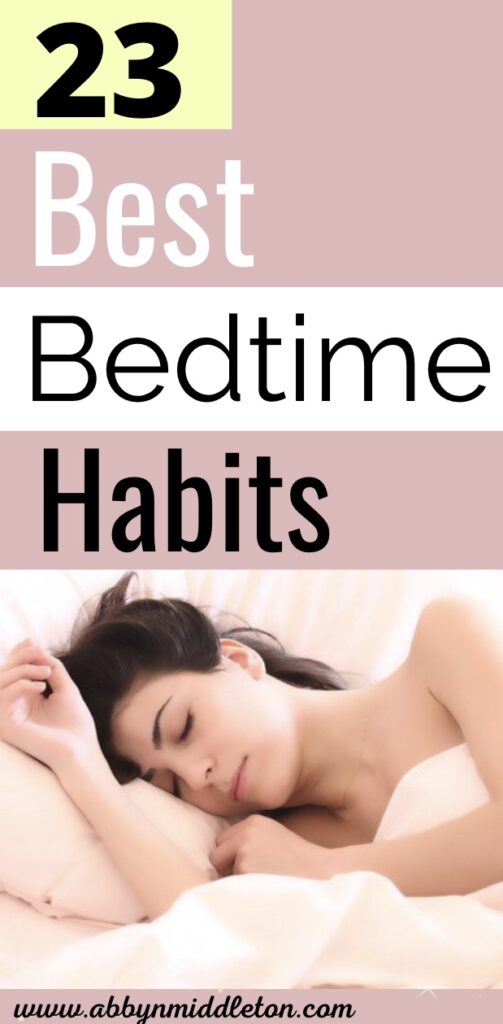
5. Sip banana tea. “Bananas have something magical in them called magnesium, which helps you shut off like a light,” says Giladi. But you know what has 3 times more magnesium than the sweet? The peel. Don’t’ worry you chomping down on the bitter taste of peels. Instead, boil a chopped banana (including the peel) in boiling water for 10 minutes. Grab the recipe for banana tea. (Source)
6. Avoid these 3 taboos. Mat Giladi, a certified personal trainer and entrepreneur from New Jersey, says these are 3 bad habits that need to broken: drinking coffee after 2 pm, eating within 3 hours of bedtime and exercising within 3 hours of bedtime. They stimulate the body instead of relaxing it and will cause sleep disturbances. One of the best bedtime habits (Source)
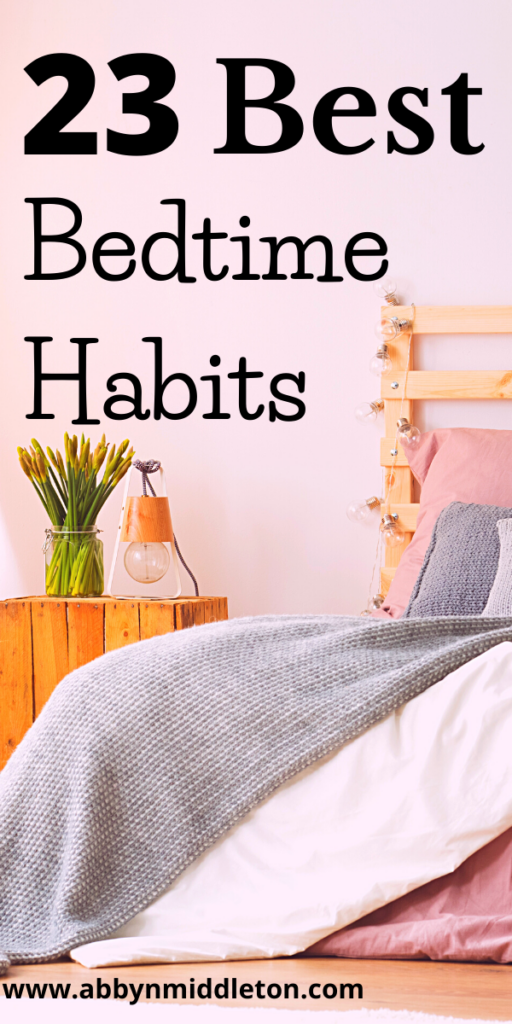
7. Make sleep a priority for the entire family. Brittany Sherwood, a psychiatric/mental health nurse practitioner and founder of mentalcalm.net, recommends putting sleep at the top of your to-do list for the whole family. Place physical reminders placed around the home on mirrors with bedtime prep messages like the time when kids need to put on their pajamas and a lights-out time. Create a family bedtime routine you can stick to help reduce stress for both parents and kids. (Source)
8. Warm your toes for better sleep. If you tend to have cold feet, try wearing socks to bed or putting a warm water bottle near your feet under the covers, advises Sherwood. Icy toes may delay you from falling asleep. One of the best bedtime habits (Source)
9. Time your workouts carefully. Better Sleep Council suggests you wrap up any vigorous exercise two to three hours prior to bedtime. That’s not to say you can’t do gentle stretches to help relax your mind and body before slipping between the sheets. Health and wellness expert Christa Gurka, an orthopedic physical therapist who specializes in Pilates-based, holistic wellness in South Florida does this soothing routine to help boost her own sleep:

- Lie on your back with your legs elevated on a wall. Try to get your bottom as close to the wall as possible to support your low back. This simple inversion relieves stress and swelling and improves circulation. Breathe deeply and hold this position for 2-3 minutes.
- Lie on your back and pull both knees into your chest. Hug your knees in as tight as you can and rock gently side to side. Then release one leg straight out onto the ground and hold the opposite knee into your chest for 30 seconds. Repeat with the other leg.
- Lie on your back with legs extended. Pull one knee into your chest grabbing behind the thigh. Gently try and straighten that leg towards the ceiling and then bend the knee again releasing the stretch. Perform 10-12 repetitions on each side.
- Lie on your stomach with your hands flat on the floor underneath your shoulders. Gently press up, lifting your head, neck, shoulders, and spine off the floor. Take a deep breath in and return to the starting position. Perform 8-10 slow repetitions.
- Sit in the child’s pose (kneeling on a padded surface, leaning forward, with arms straight out in front of you) for 3-5 minutes while taking slow, steady deep breaths. (Source)
10. Ban bed buddies. “This may be hard advice to hear and heed, but pets are not great bed buddies,” says Dr. Robert Rosenberg, founder, and CEO of NeuroTrials Research, focusing on sleep-related conditions and other neurological disorders in Atlanta. According to a survey by the Mayo Clinic Sleep Disorders Center, 53% of people who sleep with pets say that their animals disturb their sleep. A furry bed buddy is just not conducive to good sleep. One of the best bedtime habits (Source)
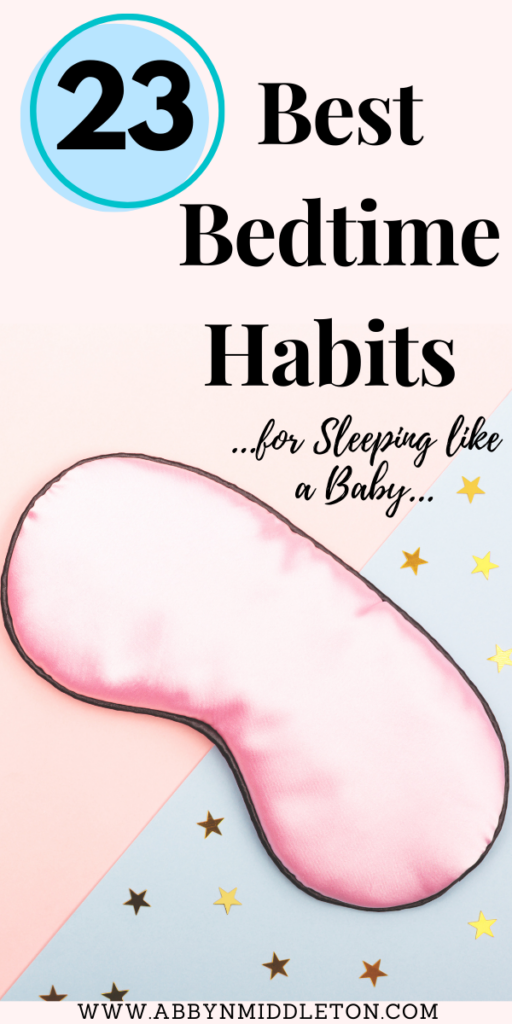
11. Skip the nightcap. “It wasn’t that long ago that physicians recommended “nightcaps” for insomniacs or others experiencing sleep problems,” says Dr. Rosenberg. “But using alcohol for sleep is a bad idea.” It alters the quality of your sleep. Even if you sleep a full night after drinking, you may not feel rested in the morning. Alcohol lightens sleep and suppresses REM. Booze will also disrupt the total time you are asleep. You may wake up frequently and have problems falling back asleep as the alcohol works through your system. Those with sleep apnea should be aware that alcohol worsens the condition. One of the best bedtime habits (Source)
12. Embrace meditation. The American Psychological Association notes that meditation and mindfulness have proven to be almost an immediate stress reliever. “When you practice meditation or engage in mindfulness, new perspectives can be gained and negative emotions can be released,” explains Daniel Turissini, founder of Recharj, mediation studios in Washington, DC, and Bethesda, Maryland. Here’s a crash course in stress relief that can be practiced at home:
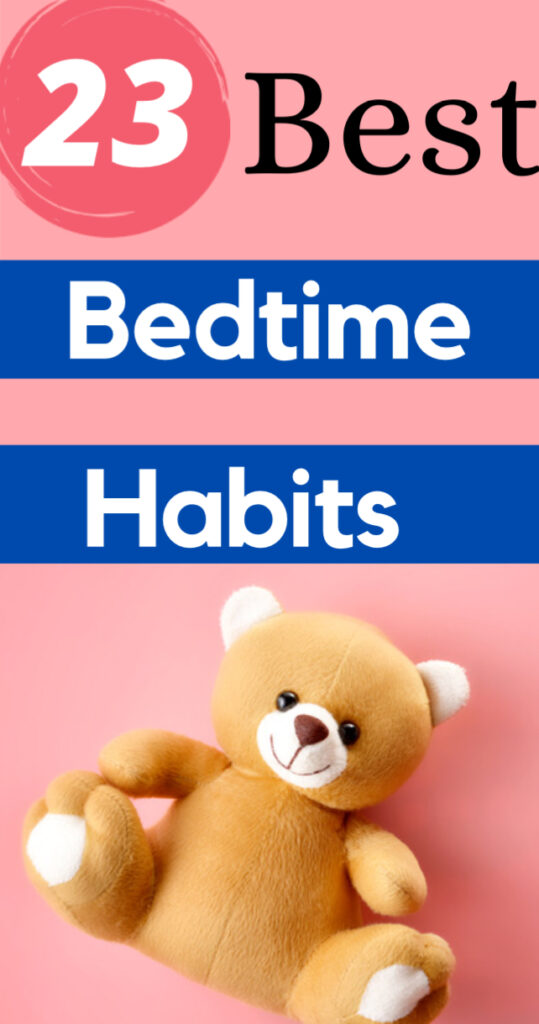
- The first step might seem familiar to you, as it is quintessential mindfulness training. Tune into your breathing, noticing whether or not it is fast or slow, deep or shallow, smooth or jagged. After understanding your breath patterns, begin to observe the effect it has on your body. What are the sensations of the breath coming in and out? What are your muscles doing? Start noticing your breath intermittently throughout the day, particular in times of stress.
- The next step involves breathing deeply and rhythmically. Learn how to take 4-8 breaths a minute for this is the “therapeutic zone” of breath work. Aim for six breaths a minute, to begin with, then adjust accordingly. Breathe in through your nose and out through your mouth. Take a moment to enjoy a sense of calm stillness before breathing in once more. (Source)
BONUS! Here is a video on some of the best bedtime habits by this lovely gal:
13 Best bedtime habits from healthline:
1. Increase bright light exposure during the day
Your body has a natural time-keeping clock known as your circadian rhythm (13, 14Trusted Source).
It affects your brain, body, and hormones, helping you stay awake and telling your body when it’s time to sleep (14Trusted Source, 15Trusted Source).
Natural sunlight or bright light during the day helps keep your circadian rhythm healthy. This improves daytime energy, as well as nighttime sleep quality and duration (16Trusted Source, 17Trusted Source, 18Trusted Source).
In people with insomnia, daytime bright light exposure improved sleep quality and duration. It also reduced the time it took to fall asleep by 83% (19Trusted Source).
A similar study in older adults found that 2 hours of bright light exposure during the day increased the amount of sleep by 2 hours and sleep efficiency by 80% (20Trusted Source).
While most research involves people with severe sleep issues, daily light exposure will most likely help you even if you experience average sleep.
Try getting daily sunlight exposure or — if this is not practical — invest in an artificial bright light device or bulbs. (Source)

2. Reduce irregular or long daytime naps
While short power naps are beneficial, long or irregular napping during the day can negatively affect your sleep.
Sleeping in the daytime can confuse your internal clock, meaning that you may struggle to sleep at night (36Trusted Source, 37Trusted Source).
In fact, in one study, participants ended up being sleepier during the day after taking daytime naps (37Trusted Source).
Another study noted that while napping for 30 minutes or less can enhance daytime brain function, longer naps can harm health and sleep quality (38Trusted Source).
However, some studies demonstrate that those who are used to taking regular daytime naps don’t experience poor sleep quality or disrupted sleep at night.
If you take regular daytime naps and sleep well, you shouldn’t worry. The effects of napping depend on the individual (39Trusted Source, 40Trusted Source, 41Trusted Source). One of the best bedtime habits (Source)
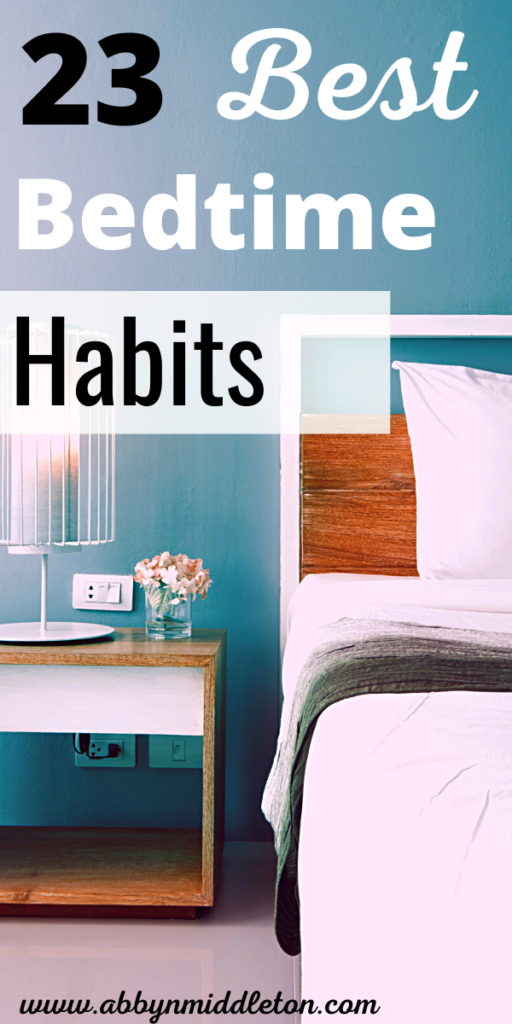
3. Try to sleep and wake at consistent times
Your body’s circadian rhythm functions on a set loop, aligning itself with sunrise and sunset.
Being consistent with your sleep and waking times can aid long-term sleep quality (42Trusted Source).
One study noted that participants who had irregular sleeping patterns and went to bed late on the weekends reported poor sleep (43Trusted Source).
Other studies have highlighted that irregular sleep patterns can alter your circadian rhythm and levels of melatonin, which signal your brain to sleep (43Trusted Source, 44Trusted Source, 45Trusted Source).
If you struggle with sleep, try to get in the habit of waking up and going to bed at similar times. After several weeks, you may not even need an alarm. One of the best bedtime habits (Source)

4. Take a melatonin supplement
Melatonin is a key sleep hormone that tells your brain when it’s time to relax and head to bed (46Trusted Source).
Melatonin supplements are an extremely popular sleep aid.
Often used to treat insomnia, melatonin may be one of the easiest ways to fall asleep faster (47Trusted Source, 48Trusted Source).
In one study, taking 2 mg of melatonin before bed improved sleep quality and energy the next day and helped people fall asleep faster.
In another study, half of the group fell asleep faster and had a 15% improvement in sleep quality (48Trusted Source, 49Trusted Source).
Additionally, no withdrawal effects were reported in either of the above studies.
Melatonin is also useful when traveling and adjusting to a new time zone, as it helps your body’s circadian rhythm return to normal (50Trusted Source).
In some countries, you need a prescription for melatonin. In others, melatonin is widely available in stores or online. Take around 1–5 mg 30–60 minutes before bed.
Start with a low dose to assess your tolerance and then increase it slowly as needed. Since melatonin may alter brain chemistry, it’s advised that you check with a healthcare provider before use.
You should also speak with them if you’re thinking about using melatonin as a sleep aid for your child, as long-term use of this supplement in children has not been well studied.
Shop for melatonin supplements online. (Source)
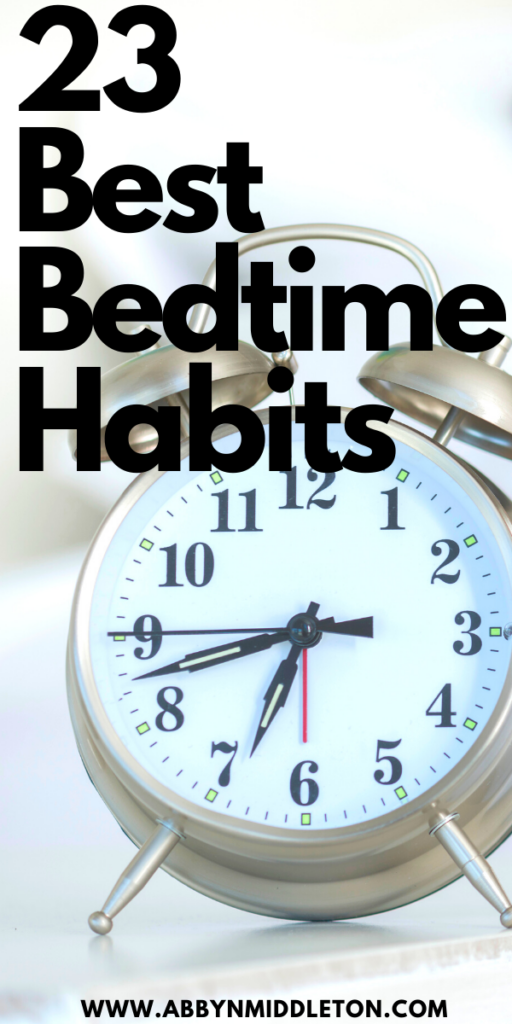
5. Consider these other supplements
Several supplements can induce relaxation and help you sleep, including:
- Ginkgo biloba: A natural herb with many benefits, it may aid sleep, relaxation, and stress reduction, but the evidence is limited. Take 250 mg 30–60 minutes before bed (51Trusted Source).
- Glycine: A few studies show that taking 3 grams of the amino acidglycine can improve sleep quality (52Trusted Source, 53Trusted Source, 54).
- Valerian root: Several studies suggest that valerian can help you fall asleep and improve sleep quality. Take 500 mg before bed (55Trusted Source, 56Trusted Source, 57Trusted Source).
- Magnesium: Responsible for over 600 reactions within your body, magnesium can improve relaxation and enhance sleep quality (58Trusted Source, 59Trusted Source, 60Trusted Source).
- L-theanine: An amino acid, L-theanine can improve relaxation and sleep. Take 100–200 mg before bed (61Trusted Source, 62Trusted Source).
- Lavender: A powerful herb with many health benefits, lavender can induce a calming and sedentary effect to improve sleep. Take 80–160 mg containing 25–46% linalool (63Trusted Source, 64Trusted Source, 65Trusted Source, 66Trusted Source, 67Trusted Source, 68Trusted Source, 69Trusted Source).
Make sure to only try these supplements one at a time. While they’re not a magic bullet for sleep issues, they can be useful when combined with other natural sleeping strategies. (Source)

6. Optimize your bedroom environment
Many people believe that the bedroom environment and its setup are key factors in getting a good night’s sleep.
These factors include temperature, noise, external lights, and furniture arrangement (77Trusted Source).
Numerous studies point out that external noise, often from traffic, can cause poor sleep and long-term health issues (78Trusted Source, 79Trusted Source, 80Trusted Source).
In one study on the bedroom environment of women, around 50% of participants noticed improved sleep quality when noise and light diminished (81Trusted Source).
To optimize your bedroom environment, try to minimize external noise, light, and artificial lights from devices like alarm clocks. Make sure your bedroom is a quiet, relaxing, clean, and enjoyable place. (Source)
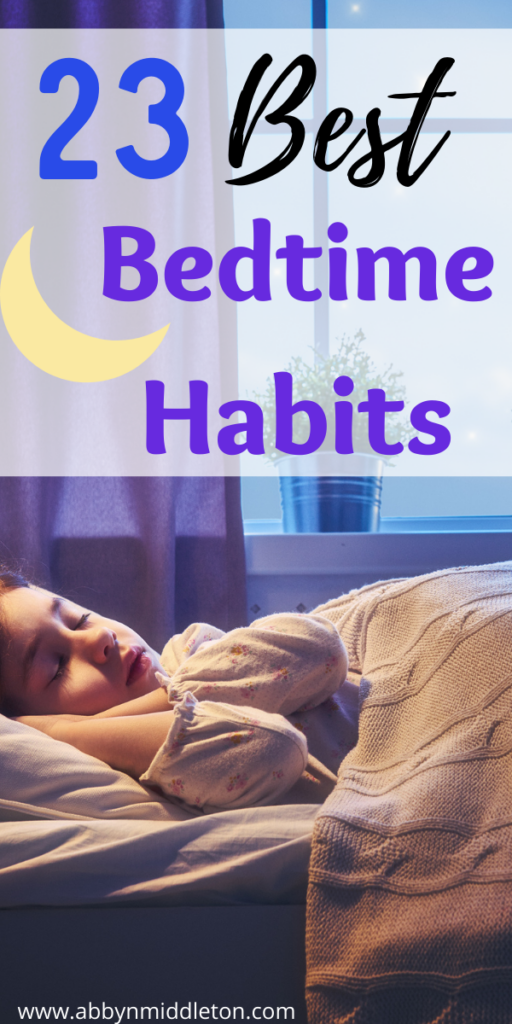
7. Set your bedroom temperature
Body and bedroom temperature can also profoundly affect sleep quality.
As you may have experienced during the summer or in hot locations, it can be very hard to get a good night’s sleep when it’s too warm.
One study found that bedroom temperature affected sleep quality more than external noise (77Trusted Source).
Other studies reveal that increased body and bedroom temperature can decrease sleep quality and increase wakefulness (82Trusted Source, 83Trusted Source, 84Trusted Source, 85Trusted Source, 86Trusted Source, 87Trusted Source).
Around 70°F (20°C) seems to be a comfortable temperature for most people, although it depends on your preferences and habits. One of the best bedtime habits (Source)
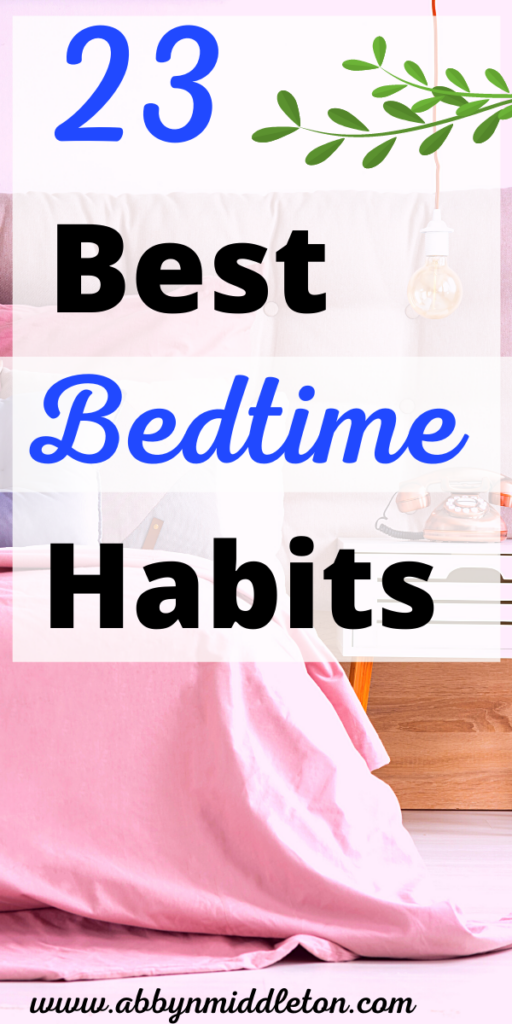
8. Don’t eat late in the evening
Eating late at night may negatively affect both sleep quality and the natural release of HGH and melatonin (88Trusted Source, 89Trusted Source, 90Trusted Source, 91Trusted Source, 92Trusted Source).
That said, the quality and type of your late-night snack may play a role as well.
In one study, a high carb meal eaten 4 hours before bed helped people fall asleep faster (93Trusted Source).
Interestingly, one study discovered that a low carb diet also improved sleep, indicating that carbs aren’t always necessary, especially if you’re used to a low carb diet (94Trusted Source). One of the best bedtime habits (Source)
9. Relax and clear your mind in the evening
Many people have a pre-sleep routine that helps them relax.
Relaxation techniques before bed have been shown to improve sleep quality and are another common technique used to treat insomnia (95Trusted Source, 96Trusted Source, 97Trusted Source).
In one study, a relaxing massage improved sleep quality in people who were ill (98Trusted Source).
Strategies include listening to relaxing music, reading a book, taking a hot bath, meditating, deep breathing, and visualization.
Try out different methods and find what works best for you. (Source)

10. Take a relaxing bath or shower
A relaxing bath or shower is another popular way to sleep better.
Studies indicate that they can help improve overall sleep quality and help people — especially older adults — fall asleep faster (99Trusted Source, 100Trusted Source, 101Trusted Source, 102Trusted Source, 103Trusted Source).
In one study, taking a hot bath 90 minutes before bed improved sleep quality and helped people get more deep sleep (100Trusted Source).
Alternatively, if you don’t want to take a full bath at night, simply bathing your feet in hot water can help you relax and improve sleep (102Trusted Source, 103Trusted Source). (Source)
11. Rule out a sleep disorder
An underlying health condition may be the cause of your sleep problems.
One common issue is sleep apnea, which causes inconsistent and interrupted breathing. People with this disorder stop breathing repeatedly while sleeping (104Trusted Source, 105Trusted Source).
This condition may be more common than you think. One review claimed that 24% of men and 9% of women have sleep apnea (106Trusted Source).
Other common medically diagnosed issues include sleep movement disorders and circadian rhythm sleep/wake disorders, which are common in shift workers (107Trusted Source, 108Trusted Source).
If you’ve always struggled with sleep, it may be wise to consult your healthcare provider. (Source)
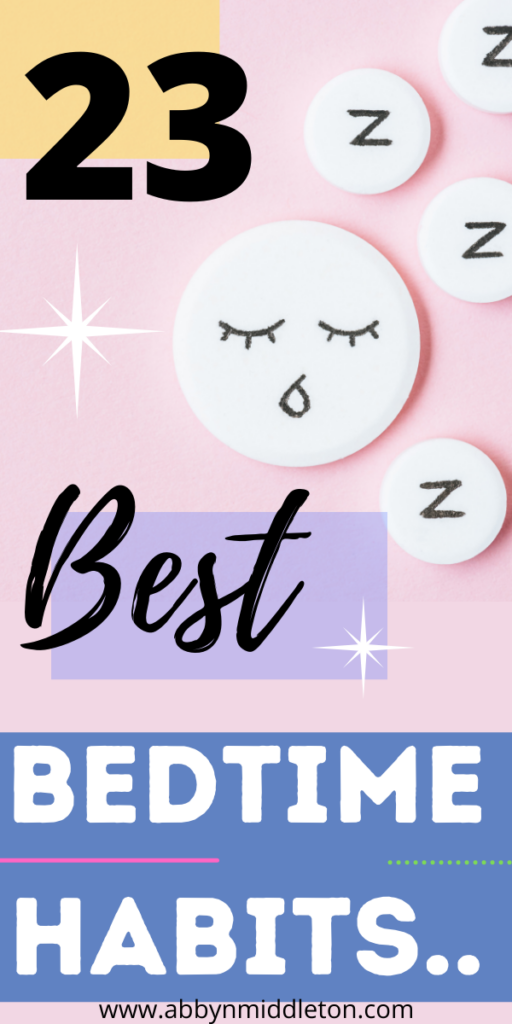
12. Get a comfortable bed, mattress, and pillow
Some people wonder why they always sleep better in a hotel.
Apart from the relaxing environment, bed quality can also affect sleep (109Trusted Source, 110Trusted Source).
One study looked at the benefits of a new mattress for 28 days, revealing that it reduced back pain by 57%, shoulder pain by 60%, and back stiffness by 59%. It also improved sleep quality by 60% (111Trusted Source).
Other studies point out that new bedding can enhance sleep. Additionally, poor quality bedding can lead to increased lower back pain (112Trusted Source, 113Trusted Source).
The best mattress and bedding are extremely subjective. If you’re upgrading your bedding, base your choice on personal preference (113Trusted Source, 114Trusted Source, 115Trusted Source, 116Trusted Source, 117Trusted Source).
It’s recommended that you upgrade your bedding at least every 5–8 years.
If you haven’t replaced your mattress or bedding for several years, this can be a very quick — although possibly expensive — fix (112Trusted Source).
Click the following links to shop for and compare mattresses and pillows. (Source)

13. Don’t drink any liquids before bed
Nocturia is the medical term for excessive urination during the night. It affects sleep quality and daytime energy (127Trusted Source, 128Trusted Source).
Drinking large amounts of liquids before bed can lead to similar symptoms, though some people are more sensitive than others.
Although hydration is vital for your health, it’s wise to reduce your fluid intake in the late evening.
Try to not drink any fluids 1–2 hours before going to bed.
You should also use the bathroom right before going to bed, as this may decrease your chances of waking in the night. (Source)
Now : ) As always, Thank you, for joining me on my journey of learning about the 23 best bedtime habits! Please, subscribe by signing up for emails to let you know right when I have a new post out, and let me know how this information is helping you below! Plus! When you sign up to get my emails you can get a FREE Printable! I hope I helped you find out information on “23 Best Bedtime Habits” New to abbynmiddleton.com? If so, check out my latest post on “5 Simple Tips For A Healthy Lifestyle” And if you liked this post you’re on, you might also like: “20 Best Morning Habits For A Refreshing & Accomplished Morning!” Stay tuned for new posts every week! 🙂